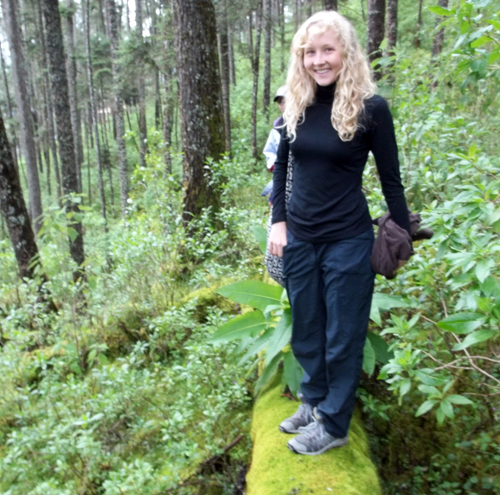
As plastics become more readily available in developing countries, disposing of plastic waste is becoming more difficult without recycling facilities. For her master’s thesis in environmental engineering and international development studies, Rachael Marshall visited Todos Santos Cuchumatán, a small indigenous community in northwestern Guatemala, to develop ways to improve solid waste management by involving the local population.
Currently, poorer rural residents have no choice but to dump their garbage near the river, which runs through the town and through downstream communities.
“There’s a lot of contamination and health issues,” says Marshall. Dogs and other domesticated animals feed on the garbage and return to their owners’ homes or pass through farmers’ markets.
“People also burn the garbage instead of taking it to the dump because the municipality only collects waste in the rich part of town, so there’s a lot of air contamination.” Local doctors blame air pollution for causing breathing problems for residents.
Vets Without Borders, which is working in the area to help control the dog population, brought the waste management problem to the attention of U of G’s School of Engineering.
Previous research focused mostly on the technical aspects of waste management rather than the roles that people play in both the cause and the solution. “I was looking at it from a much broader perspective and trying to understand it from the perspective of the people,” says Marshall.
Earlier waste management approaches failed because they lacked community input. “Participatory systems analyses are pretty unique. It’s very difficult to understand a larger system if you don’t even talk to the people who live within that system. They’re the ones that need to decide what’s the appropriate approach to dealing with the waste issue.”
A solution that works in one community may not work in another because of different political, economic, cultural and environmental factors. Garbage trucks that run on paved roads, for example, are unsuitable for dirt roads through mountainous terrain.
Marshall points to a wastewater treatment facility installed by the European Union in Todos Santos Cuchumatán in 2007. “It was never used, because people didn’t know how to use it,” she says. “The technology wasn’t appropriate for the community.”
Marshall looked at best practices in other Latin American communities to learn whether those solutions could be applied in Todos Santos Cuchumatán. After eliminating options that were politically or economically inappropriate for the area, she came up with four scenarios for different parts of town.
Those scenarios will eventually be presented to the community, allowing residents to decide which solution is best for them. Solutions will be translated into the local language and possibly turned into a video for people who are unable to read.
One suggestion is to use pushcarts to collect recyclable materials instead of trucks that are too large for the narrow streets of the village. Another option is to introduce a tax to help pay for garbage collection. Getting women and young people involved is another important step, says Marshall, adding that men mostly looked after waste disposal. Referring to those women and young people, she says, “They have a lot of really great ideas. These are intelligent people that have a lot of capacity.”
Western culture has a big impact on young people, she adds, and they want the same things that their counterparts have in North America. This has led to a consumer culture in which people buy more products than they need and produce more waste. The community’s elders fear that western culture will eventually replace their traditions.
“People in developing countries have just as much pride in their lives as we do here,” says Marshall. “You have to find a balance between all these different aspects, and you can’t do that if you don’t talk to the people and help them become the innovators. You can’t innovate for people.”
Marshall spent three weeks in Todos Santos Cuchumatán in summer 2011. She also volunteered on a farm in Costa Rica for a few months and travelled throughout Central and South America. “I really feel a passion for the people there.”